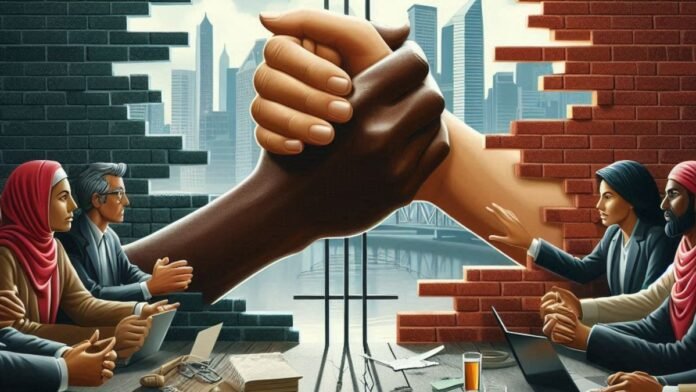Confronting racism and prejudice is a critical issue in today’s society. Racism and prejudice can manifest in various forms, from subtle microaggressions to overt discrimination, and it can be found in many different areas of society, including media, service organizations, and law and policy. The effects of racial prejudice and racism can be seen everywhere, from stereotypes and violence to underfunded schools, unemployment, and police brutality.
Acknowledging the existence of racial prejudice and racism is the first step in addressing this issue. It is important to understand that bias can manifest in various forms, and it is essential to recognize the different ways in which it can present itself. Whether it is through verbal or nonverbal communication, social and organizational practice, or law and policy, racism and prejudice can have a significant impact on individuals and communities.
Breaking barriers and confronting racism and prejudice is a complex issue that requires a multifaceted approach. It involves not only acknowledging the issue but also taking action to address it. By working together, we can reduce the impact of racial prejudice and racism and foster a more inclusive society.
Historical Context of Racism
Racism has been a pervasive issue throughout history, with roots that can be traced back to colonialism and slavery. Understanding the historical context of racism is crucial in confronting and dismantling it in today’s society.
Colonialism and Slavery
The transatlantic slave trade brought millions of Africans to the Americas, where they were forced into slavery and subjected to brutal and inhumane treatment. The ideology of white supremacy was used to justify the enslavement of Africans, and the legacy of this ideology continues to impact society today. Colonialism also played a role in the spread of racism, as European powers colonized and exploited other parts of the world, often using racist beliefs to justify their actions.
Civil Rights Movements
Throughout history, there have been numerous civil rights movements aimed at combating racism and prejudice. In the United States, the Civil Rights Movement of the 1950s and 1960s was a pivotal moment in the fight for racial equality. Led by figures such as Martin Luther King Jr., the movement sought to end segregation and discrimination against African Americans. Similar movements have taken place in other parts of the world, including South Africa’s anti-apartheid movement.
Legislation and Policy Changes
In addition to civil rights movements, legislation and policy changes have played a role in combating racism and prejudice. In the United States, the Civil Rights Act of 1964 outlawed discrimination based on race, color, religion, sex, or national origin. Other countries have passed similar laws aimed at promoting equality and combating discrimination. Despite these efforts, racism and prejudice continue to persist in society today, highlighting the need for ongoing education and action to address these issues.
Modern Challenges and Solutions
Institutional Racism
Institutional racism refers to the ways in which racism is embedded in the policies and practices of institutions, such as schools, workplaces, and government agencies. The effects of institutional racism can be seen in disparities in education, employment, and healthcare, among other areas. To combat institutional racism, it is important to identify and address the ways in which policies and practices perpetuate racism. This can include implementing diversity and inclusion initiatives, training staff and employees on cultural competency, and ensuring that policies are equitable and inclusive.
Social Activism and Advocacy
Social activism and advocacy are important tools for combating racism and prejudice in society. This can include participating in protests, signing petitions, and supporting organizations that work towards racial justice. Social media has also become an important platform for social activism, allowing individuals to raise awareness and share information about issues related to racism and prejudice.
Education and Awareness Programs
Education and awareness programs can play a crucial role in breaking down barriers and confronting racism and prejudice. This can include programs that teach individuals about the history and impact of racism, as well as programs that promote diversity and inclusion. Schools, workplaces, and community organizations can all play a role in promoting education and awareness about racism and prejudice.
Intersectionality and Inclusivity
Intersectionality and inclusivity are important concepts for addressing racism and prejudice in a comprehensive way. Intersectionality refers to the ways in which different forms of oppression, such as racism, sexism, and homophobia, intersect and compound each other. Inclusivity refers to the importance of creating spaces and policies that are welcoming and inclusive of individuals from diverse backgrounds. By taking an intersectional and inclusive approach, it is possible to address the root causes of racism and prejudice and create a more just and equitable society.




